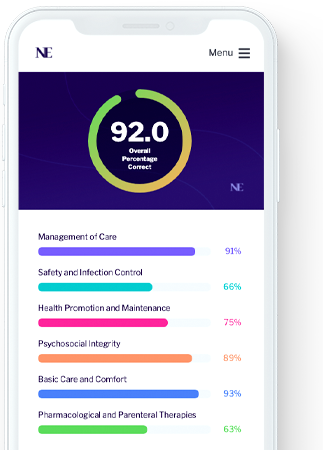RN to MSN
Registered nurses (RNs) play a crucial role within our healthcare system, providing advanced nursing care to patients in a variety of settings. Many RNs choose to further their education at the graduate level by obtaining a Master of Science in Nursing (MSN) degree. This guide will discuss the many specialties you can pursue with an MSN, the benefits of obtaining an MSN, and the different paths an RN can take to transition from RN to MSN.
What is a Registered Nurse (RN)?
A registered nurse is a licensed healthcare professional who provides multifaceted and complex nursing care to patients. RNs are trained to give care to patients who may be medically unstable and require advanced nursing interventions. Because registered nurses operate under their own licenses, they do not require direct supervision to perform tasks within their scope of practice. RNs work collaboratively with mid-level providers (physician assistants and nurse practitioners) and physicians.
In order to sit for the National Council Licensure Examination for Registered Nurses (NCLEX-RN), you must have completed at least an Associate Degree in Nursing (ASN). Registered nurses are a critical part of the healthcare team, and they work in a variety of settings, including hospitals, outpatient centers, educational institutions, clinics, home health, long-term care facilities, and more.
Examples of clinical tasks performed by RNs include:
- Conducting patient assessments
- Administering medications
- Administering blood products
- Administering chemotherapy agents
- Obtaining vital signs and monitoring patients for changes in condition
- Inserting and maintaining intravenous lines, nasogastric tubes, and urinary catheters
- Performing phlebotomy
- Obtaining specimens for laboratory testing
- Providing basic and advanced wound care
- Providing education to patients and their families
MSN Specialty Options
While you can still continue to work at the bedside with an MSN, other doors open for you after you have obtained a graduate degree. In fact, several specialties require or highly prefer candidates to have a minimum of an MSN, including:
Choosing your MSN specialty track is an important decision since it significantly impacts the direction of your career moving forward. It is important to choose a track that you are passionate about and that matches both your professional goals and personal responsibilities.
Benefits of an MSN Degree
Deciding to go to graduate school is a big decision and one that should not be taken lightly. There are many benefits to obtaining your MSN, including higher income potential, better job opportunities, and career advancement opportunities.
Salary
Salaries for MSN-prepared RNs vary greatly by specialty. However, it is generally expected that nurses with an MSN would make more money than nurses with an ASN or Bachelor of Science in Nursing (BSN).
According to the U.S. Bureau of Labor Statistics, the highest-paying nursing specialty for which at least an MSN is required is Certified Nurse Anesthesia, with a mean annual salary of $205,770.
It’s important to note that the U.S. Bureau of Labor Statistics data does not differentiate between the types of degrees held and the reported salaries. Some nurses have terminal degrees, such as a Doctor of Philosophy in Nursing (PhD) or a Doctor of Nursing Practice (DNP). These nurses often make even higher salaries than MSN-prepared nurses, even if they are performing the same job.
Job Opportunities
MSN-prepared nurses are more marketable for certain job opportunities compared to nurses without a graduate degree. As mentioned above, several specialties require at least an MSN to practice.
In general, having an MSN will give you a significant advantage during the job search process, particularly in highly competitive specialties. Consider this: A hiring manager has two nurses’ resumes in front of them. Both nurses have similar professional experience, but one of them has a BSN, and the other has an MSN. In this situation, the hiring manager will most likely pick the nurse with the MSN degree.
Career Advancement Opportunities
MSN-prepared nurses are more likely to be chosen to advance into leadership and management roles compared to nurses with lower degrees. In fact, many employers highly prefer, or even require, an MSN degree for these types of roles. If one of your career goals is to be a nursing leader or manager, obtaining your MSN degree is a wise decision.
It is also important to note that some employers provide tuition assistance for ADN- or BSN-prepared nurses to return to school for their MSN. Tuition assistance programs can ease some of the financial strain of going back to school, but they are often accompanied by crucial stipulations.
For example, some employers may require the employee to continue working for them for a specified number of years after finishing their degree. If the employee chooses to resign or is terminated before the commitment is completed, the employee is obligated to pay a portion of the tuition back to the employer.
How to Transition From RN to MSN
Your path to transitioning from RN to MSN will vary depending on whether you are starting with an ADN or BSN degree. Either way, you must be willing to commit yourself to multiple years of additional schooling and consider how this commitment may affect your professional and personal responsibilities.
Option #1: ADN to BSN to MSN
If you are starting off with an ADN degree, you can enroll in an RN-to-MSN program. This path will take longer, but you will complete an accelerated BSN and MSN curriculum concurrently, awarding you both degrees when you are finished. Most RN-to-MSN programs take between 2-4 years to complete, depending on the degree you start with and the MSN specialty you choose. Some MSN programs are completed entirely online, while others will require clinical or preceptorship hours that must be completed in person.
Alternatively, you can pursue your BSN first, and then obtain your MSN at a later time. Most ADN–prepared nurses opt to complete an accelerated RN-to-BSN program, which is specifically designed for people who are already registered nurses. RN-to-BSN programs can be completed in as little as 1 year of full-time study.
Option #2: BSN to MSN
If you already have a BSN, you can enroll in a traditional MSN program. These programs typically take between 2-3 years to complete, depending on the MSN specialty. The specialty you choose will also determine how much of your coursework will be online and how many clinical or preceptorship hours you must complete in person before obtaining your degree.
If you are pursuing an advanced practice registered nurse (APRN) specialty, such as an NP or CRNA, then you will be required to take an additional examination in order to become licensed to practice.
Nurse practitioner students must pass either the American Nurses Credentialing Center (ANCC) exam or the American Association of Nurse Practitioners (AANP) exam in their respective specialty.
Nurse anesthesia students must pass the national certification examination from the National Board of Certification and Recertification for Nurse Anesthetists (NBCRNA).
Whether or not you pass or fail your respective exam does not affect your RN license in any way. You will still be allowed to practice as an RN while in school and while you are studying for your APRN licensing exam.




